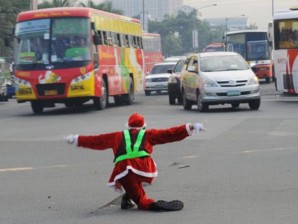MANILA – Thousands of traffic enforcers struggle grimly to keep the Philippine capital’s notoriously gridlocked roads moving every day, but Ramiro Hinojas does it with a smile and a little help from Michael Jackson.

Philippine traffic enforcer Ramiro Hinojas, wearing Santa Claus costume, directs traffic along a major road in Manila on December 6, 2011. Popularly known as the "dancing traffic cop", the barely five-foot Hinojas, 55, is one of thousands of traffic enforcers who struggle daily to keep Manila's notorious road traffic from moving, despite insults from some impatient motorists and health dangers posed by pollution. TED ALJIBE/AFP PHOTO
Rain or shine, seven days a week, the diminutive 55-year-old stands in the middle of one of Manila’s major intersections, and to the cacophony of roaring engines, puts on an elaborate dance show as he deftly guides traffic flow.
The struts and footwork may have been copied from the King of Pop, Hinojas’ deceased American idol, but the flare and passion by which he mixes them with hand signals to direct amused motorists are uniquely his own.
His sleek moves, which appear on Youtube, have made him a minor celebrity and a champion for the country’s lowly paid traffic force that is faced with the impossible task of trying to keep roads flowing freely.
“It gives me joy to see people happy while they’re stuck in traffic, because I know how the rush hour can make anyone crazy,” Hinojas told AFP in between breaks at the main junction in Manila’s Macapagal Boulevard.
The father of three has been adding even more spice to his routine this month, dressing up in a Santa Claus outfit to help motorists cruise into the Christmas season.
One of 16 children from an impoverished family in the central Philippines, Hinojas came to live in the chaotic slums of Manila as a boy.
He found his calling as a traffic enforcer about a decade ago when he was laid off from his previous job as a security guard.
Hinojas said he decided to introduce the dance routines in an effort to get motorists to take notice and follow his instructions.
“So I picked up the dance moves of Michael Jackson, and adapted them for my routine,” he said.
The Metropolitan Manila Development Authority (MMDA), the agency that oversees traffic management in the megacity of 12 million, said it employed about 2,000 full-time enforcers.
The number, however, could run into the many thousands, because various districts where the MMDA does not operate also deputise their own traffic volunteers. Hinojas is one of those deputies, and easily the most flamboyant.
With their blue or green uniforms, the enforcers crowd small and big intersections even when there are perfectly working traffic lights, ready to pounce on erring speedsters who ignore the signals.
They are supposed to help out when traffic lights fail, or when perennial floods render areas impassable.
But because some roads are so densely packed and slow moving, vehicles often get caught by the red light in the middle of the junction, meaning the enforcers have to take over the chaotic road management.
MMDA spokeswoman Alu Dorotan said that apart from being exposed to terrible pollution, traffic enforcers sometimes fall victim to “road rage” partly because they have the power to issue motorists’ fines for traffic violations.
At least two have been wounded in gun attacks by drivers since September, according to the MMDA.
The assailants in both instances have been caught and charged in court, but in a country where unlicensed firearms proliferate and where rights groups complain of a culture of impunity, Dorotan said more attacks were likely.
“Other constables have been punched and verbally abused in scenarios that could have turned worse,” Dorotan said.
Hinojas said his dance routines were precisely meant to relieve those kinds of tensions.
And entertained commuters often show their appreciation by honking their horns, as he wriggles his bottom and pirouettes to pull in oncoming traffic.
Others take the time to stop at a nearby mall to buy him food and offer cash donations that augment his measly take-home pay that equates to less than three dollars a day.
“He is very nice, and dances for us while we’re stuck in traffic,” said a smiling Reynaldo Nieto, a bus driver who passes by the busy intersection several times a day, and a self-proclaimed Hinojas fan.
“We always follow his traffic commands.”
There are some, however, who ignore the law, hurl insults, and challenge his authority.
Hinojas said he remembered one instance when teenagers gave him a lunch pack, only for him to find out it consisted of left over chicken bones.
But despite the insults and other hardships, he genuinely appears to love his job.
“Sometimes I get sick from being under the sun too long, or if I get wet from the rain, but I always tell my family that in my own small way, I am doing my share to improve the country by putting things in order.”

